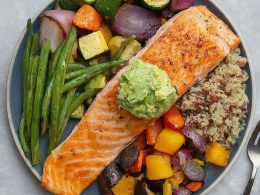Food is a fundamental part of our lives – it gives us energy, nourishment and sustenance. But did you know that what we eat can also have a profound impact on our happiness? It’s true! The food we consume has the power to affect not only our physical health but also our emotional well-being. In this blog post, we’ll uncover the surprising connection between food and happiness and explore which types of foods you should be eating (and avoiding!) if you want to boost your mood and feel happier overall. So let’s dig in!
The Link Between Food and Happiness
Have you ever noticed how your mood can shift after eating certain foods? Perhaps you’ve experienced a sudden surge of happiness and energy after indulging in a piece of chocolate cake or felt lethargic and irritable after consuming too much junk food. These changes in mood are not just coincidences – they’re actually linked to the way that different types of food affect our brain chemistry.
Research has shown that there is a direct connection between what we eat and how we feel. Certain foods contain chemicals and nutrients that have been proven to boost our mood, reduce stress levels, promote relaxation, and enhance feelings of pleasure. For example, dark chocolate contains phenylethylamine (PEA), which triggers the release of endorphins – natural chemicals in the body that make us feel happy.
On the other hand, consuming processed or sugary foods can cause significant fluctuations in blood sugar levels, leading to irritability, anxiety and fatigue. This is because these types of foods don’t provide sustained energy for our bodies to use throughout the day.
In short, our diet plays an essential role in determining our emotional state. By choosing healthy wholefoods rich in vitamins and minerals like leafy greens, fruits or nuts we ensure optimal physical health as well mental wellbeing!
The Different Types of Foods That Can Make You Happy
We all know that food is essential for our survival, but did you know that certain types of food can also make us happy? Yes, it’s true! The foods we eat have a direct impact on our moods and emotions. Let’s take a look at the different types of foods that can make us feel good.
Firstly, eating complex carbohydrates like whole grains or sweet potatoes can boost serotonin production in the brain which helps regulate mood and appetite. Also, foods rich in omega-3 fatty acids such as salmon and walnuts are known to reduce anxiety symptoms.
Furthermore, dark chocolate is great for boosting endorphins – natural chemicals in your body responsible for feelings of pleasure. So next time you’re feeling down, grab a piece of dark chocolate instead of reaching out for junk food options like chips or candies.
Moreover, including probiotic-rich foods like yogurt or kefir into your diet can help improve gut health which has been linked to reducing stress and anxiety levels.
Incorporating mood-enhancing spices such as saffron or turmeric into meals not only adds flavor but may also positively affect mental well-being due to their anti-inflammatory properties.
Choosing healthy and nutritious foods over processed snacks will not only benefit your physical health but also contribute towards overall well-being by promoting happiness through proper nutrition.
Foods to Avoid If You Want to Be Happy
It’s no secret that what we put into our bodies has a direct impact on how we feel. Certain foods can boost our mood and make us feel happy, while others can leave us feeling sluggish and irritable. If you’re looking to improve your overall happiness, it’s important to be mindful of the types of foods you consume.
One food group to avoid if you want to maintain a positive outlook is processed or junk food. These types of foods are often high in sugar, unhealthy fats, and refined carbohydrates which can lead to inflammation in the body and ultimately affect our mood negatively.
Alcohol is another culprit when it comes to dampening our happiness levels. While having a drink now and then may temporarily lift your spirits, overconsumption can lead to feelings of depression and anxiety.
Highly caffeinated beverages like coffee or energy drinks should also be consumed in moderation if you’re looking for sustained happiness throughout the day. Caffeine can cause jitters and anxiousness which isn’t conducive for maintaining a peaceful state of mind.
Try avoiding artificial sweeteners found in many diet products as they have been linked with increased feelings of anxiety.
By being aware of these common culprits that lead towards an unhappy lifestyle , you’ll be able make better food choices that contribute towards cultivating lasting joy within yourself .
Conclusion
The connection between food and happiness is real, and it’s important to pay attention to what we eat if we want to maintain a positive mood. By consuming foods that contain essential nutrients like omega-3 fatty acids, vitamins B6 and D, and magnesium, we can boost our levels of serotonin and dopamine – two neurotransmitters linked to feelings of pleasure and happiness.
On the other hand, consuming too much sugar or processed foods can have negative effects on our mood over time. It’s also worth noting that while food can certainly impact how happy we feel in the short term, it’s not a substitute for seeking professional help if you’re struggling with a mental health condition.
So next time you sit down for a meal or reach for a snack, remember that your choices could be impacting more than just your physical health – they could be playing an important role in your emotional wellbeing as well.









